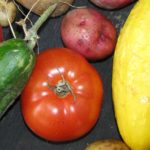Americans Waste Food!
We were astounded to read a news story stating that 20% of Iowa’s trash is food waste. That’s about 556,000 tons of food tossed out by our state’s people, and Iowan’s aren’t unusual. Americans everywhere discard food into the trash or grind it in the garbage disposal and send it off to the sewer plant. Other solutions exist!
Winding Pathways isn’t a contributor to this vast waste because we manage our family food carefully. Our main way of reducing waste is buying carefully so we don’t end up with more perishables than we can eat in a reasonable time. It saves money at the market, but still, a lot of scraps result from meal preparation.
Save Money. Create Soil.
Instead of tossing out potato and carrot peels, bits of rice that get caught in the sink strainer, onion skins, shrimp tails, egg shells, coffee grounds, and a host of other organic matter we separate it into two bowls that we empty daily.
Our first bowl becomes chicken treats. Our 14 hens love shrimp tails, wilted lettuce, bread crusts and other items we can’t eat. When we approach the coop with our scrap bowl our hens rush to meet us and devour the treats with considerable enthusiasm. In a day or two they return the favor by presenting us with delicious eggs.
Our second bowl is everything the chickens won’t eat or we don’t want them to eat and includes potato peels, egg shells, coffee grounds and filters, avocado skins, citrus fruit skins and other relatively course organic items that most folks toss in the trash. These become the ingredients for rich compost.
Our composter is gradually filled overwinter. We create a layer of food scraps a couple of inches thick and then add a layer of chicken manure mixed with wood chips from the coop and ash from the woodstove. Manure is another gift from our hens that speeds up the composting process. The layers gradually decompose, and by spring we harvest outstanding rich compost to dig into our garden.
Return on Our Dollar
We don’t buy fertilizer. We make it from food scraps. Beans, squash, carrots, okra, chard, kale, lettuce, and tomatoes seem to jump from the compost-enrichened soil, and on many summer days everything we eat comes from the yard.
Then we return the little scraps from our garden vegetables to the chickens or compost pile, completing a cycle of abundance. We save money and spare the landfill unnecessary waste.



Totally agree! Yesterday I cut up a pineapple and put the bottom & top on the deck table. Who enjoyed it? Our squirrel!
Fresh vegetable and fruit scraps can be recycled in your
garden, but not meat or cooked items that haven’t been
consumed. Please note in your blog items that can be
safely recycled and those that can’t Love, Jac
Right. No meat in compost.